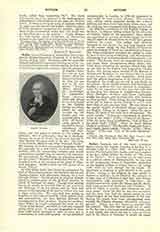

Butler, ALBAN, historian, b. October 10, 1710, at Appletree, Northamptonshire, England; d. at St-Omer, France, May 15, 1763. He shares with the venerable Bishop Challoner the reputation of being one of the two most prominent Catholic students during the first half of the dreary eighteenth century, when the prospects of English Catholics were at their lowest. After the death of his father in 1712, he was sent to the celebrated “Dame Alice’s School”, at Fernyhalgh, in Lancashire. From thence while still young he was transferred to the English College at Douai, where he went through the full course, and was ordained priest in 1735. He had already gained a reputation for extraordinary diligence and regularity, and was asked to remain at the college as professor, first of philosophy, later on of theology. During his years at Douai, he devoted himself to what became the great work of his life, “The Lives of the Fathers, Martyrs and Other Principal Saints”. His mastery of ancient and modern languages fitted him specially for a task which involved such wide reading, while his unremitting industry and steady perseverance enabled him to overcome all obstacles. He also assisted Dr. Challoner, by preparing matter for the latter’s “Memoirs of Missionary Priests”, the standard work on the martyrs of the reign of Elizabeth and later. Butler’s notes are still preserved at Oscott College.
In 1745 Alban Butler was chosen to accompany the Earl of Shrewsbury and his two brothers, James and Thomas Talbot, both afterwards bishops, on a tour through Europe. On his return he acted as mission priest in various parts of the Midland District, to which he belonged by origin. Though ever seeking leisure for study, we are told that he was precise in the discharge of all his duties, and his time was always at the disposal of the poor or others who had a claim upon him. We next find him acting as chaplain to the Duke of Norfolk, whose nephew (and heir presumptive), the Hon. Edward Howard, he accompanied to Paris as tutor. During his residence there, Butler at length completed his work on the “Lives of the Saints”, on which he had been engaged nearly thirty years. It contains biographies of more than 1,600 saints arranged in order of date; and is a monument of work and research. It was published anonymously, in London, in 1756-59, nominally in four, really in seven octavo volumes. This was the only edition which appeared during the author’s lifetime; but there have been many others since, and the work has been translated into Italian and French.
In 1766 the presidency of the English College at St-Omer, in France, falling vacant by the elevation of Thomas Talbot to the episcopate, Alban Butler was appointed to succeed his former pupil, no doubt that he might be placed where he would have greater facilities for study. The college had formerly belonged to the Jesuits, but had been handed over to the secular clergy by the French Government when the Society of Jesus was banished from France. The Douai authorities accepted the college in order to save it from being confiscated, with the intention of restoring it to its owners should circumstances ever permit. The Jesuits, however, resented their action. and under these circumstances Alban Butler hesitated about accepting the position offered him; but we are told by his nephew and biographer, Charles Butler, that having taken counsel of the Bishops of Amiens and Boulogne, he was advised that he could accept the post with a safe conscience. A few years later the general suppression of the Society of Jesus throughout the world put an end to any doubt on the matter. Butler found, however, that his hopes of leading a studious life were doomed to disappointment, for his reputation by this time was such that no less than four bishops of neighboring dioceses, Arras, Boulogne, St-Omer, and Ypres, continually sought his advice, and invested him with faculties as vicar-general. Thus during the concluding years of his life he had to devote himself to active work more than at any previous time. He was buried in the parish church of St-Denis almost opposite to the English College at St-Omer. Since the Revolution, all traces of his tomb have disappeared. His works include: “Letters to a Gentleman on Bower’s Lives of the Popes” (1754); “Lives of the Saints” (1756-59; many times republished); “Life of Mary of the Holy Cross” (1767). After his death Bishop Challoner published “The Movable Feasts and Fasts”; and Charles Butler edited: “Travels” (1791), “Meditations” (1791) and, “Life of Sir Tobie Matthews” (1795).
BERNARD WARD

